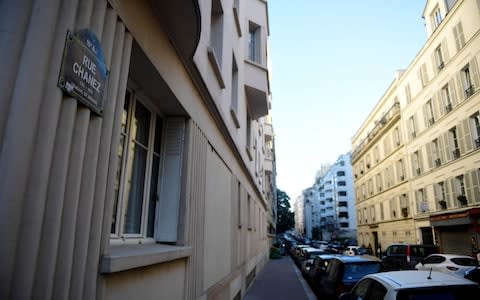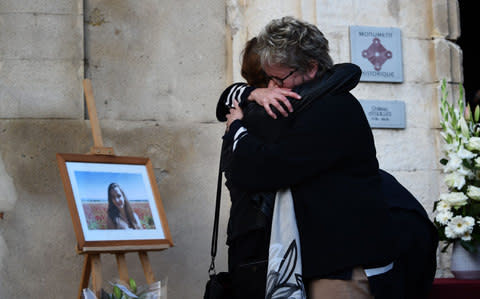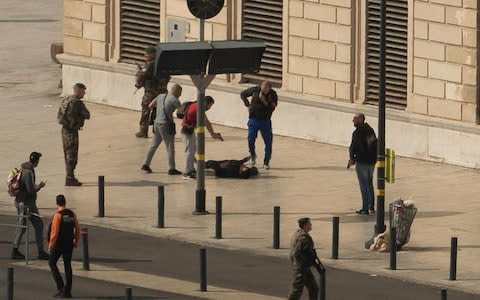Five questioned over 'primed bomb' found in plush Parisian district as France passes tough new anti-terror law

French anti-terror investigators are questioning five people over the discovery of a primed bomb at an apartment bloc in one of Paris's plushest districts, amid government warnings that France is "still at war".
The arrests came as four people were seized in Marseille, southern France, in connection with an attack on Sunday in which a knifeman stabbed two 20-year old women to death in the southern port of Marseille. Police also raided buildings as they sought to piece together where he had stayed before the attack.
With the terror threat at maximum levels, the French parliament today overwhelmingly passed an anti-terrorism bill that boosts police powers to search and restrict people's movements but which rights groups warn restricts civil liberties.
The five arrested over the Paris bomb, men in their thirties, are known to authorities and one is on an intelligence services list of "radicalised" people, which includes the names of potential Islamist militants.
We are still in a state of war
Gérard Collomb, French interior minister
"We are still in a state of war," French interior minister Gérard Collomb told France Inter radio, adding that 12 terror plots had already been foiled this year.
Judicial sources said the explosive device included two gas canisters inside the building in the affluent 16th arrondissement of western Paris and two outside, some of them doused with petrol and wired to connect to a mobile phone. It appears there were several unsuccessful attempts to detonate the canisters.
A resident alerted police at 4.30am on Saturday morning after being woken by noise in the stairwell and bomb squads were sent in to defuse the device.
Speaking to Le Parisien, the unnamed man in his forties said: "It smelled of petrol…There must have been at least 30 litres of petrol.
"I turned off the gas canisters and took them outside. At the same time, I had the emergency services and police on the line so they should be thanked."
He added: "I'm still in shock. We're going to try and return to normal life, go to work, as if nothing had happened."

The arrests, mainly in the Essonne area, south of Paris, were made after police matched fingerprints on a canister to one of the men.
Mr Collomb said it was unclear why the home-made bomb had been planted at this particular location as there was no obvious target living there.
"Was blowing up a building in a chic district of Paris a sign that nobody is safe and that this doesn't just happen in the suburbs and in rather working class districts but can happen anywhere in France?," he asked.
However, Le Figaro cited investigative sources as believing the suspects had hoped to target a "militant association against radical Islamism" but got the wrong address due to a homonym.
The sophistication of the explosive device confirms fears raised in a Europol report last month that terrorists are seeking to launch attacks in the West using improvised explosive devices, or IEDs. Last month, police stumbled on a bomb-making factory with four kilogrammes of explosives in Villejuif, south of Paris, after a tip-off from a neighbour.
A counter-terrorism investigation is also under way after Sunday's Marseille attack, in which a man slit the throat of one of his victims and killed her cousin before being shot dead by soldiers at Saint Charles train station.

A separate inquiry has been opened to establish why the man, Ahmed Hanachi, who had been briefly detained by police the day before in the city of Lyon, had been released. He had seven encounters with French police and no residency papers, but wasn't expelled from the country.
Mr Collomb said that the assailant had Italian residency and a valid Tunisian passport. According to Italian reports, he had lived from about 2006-2014 in Aprilia, south of Rome, in an area with a sizeable Tunisian community, and had married, then divorced, an Italian woman.
Four people from the area have been recently expelled Italy for alleged radicalisation, according to La Repubblica.

With jihadist attacks claiming 241 lives in France over the past three years, French MPs adopted new legislation yesterday (Tues) to extend the powers of security agencies. Some 415 voted for, 127 against and 19 abstained.
France declared a state of emergency in late 2015 after the Paris attacks, giving police sweeping search and arrest powers to combat would-be terrorists.
The new legislation will make many of those emergency measures permanent.
The interior ministry, without approval from a judge, will be able to set up security zones when there is a threat, conduct searches and restrict the movement of people and vehicles.
It will have more power to shut down places of worship if intelligence agencies believe religious leaders are inciting violence in France or abroad or justifying acts of terrorism.
Police will also have greater powers to raid private property, with a warrant, and will have greater latitude to impose restrictions on the movement of people considered a national security threat, via, in some cases the use of electronic surveillance tags.
Rights groups and parts of the French Left warned that the bill infringes civil liberties, while some Right-wingers, along with the far-Right Front National said it does not go far enough and will leave France exposed.

 Yahoo News
Yahoo News 
